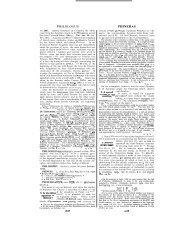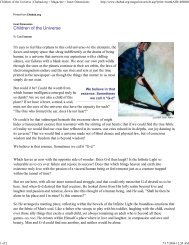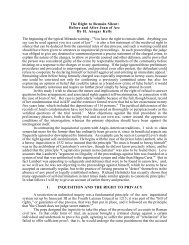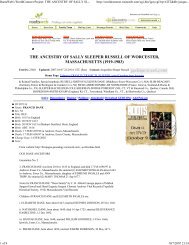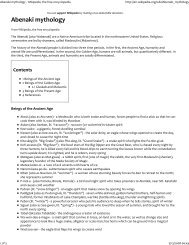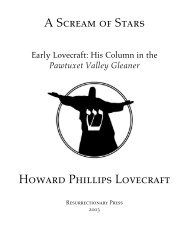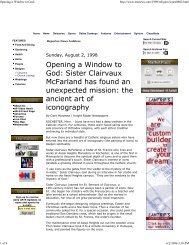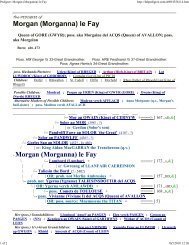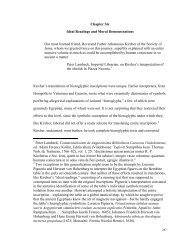Encylodaedia Biblica; a critical dictionary of the literary, political and ...
Encylodaedia Biblica; a critical dictionary of the literary, political and ...
Encylodaedia Biblica; a critical dictionary of the literary, political and ...
Create successful ePaper yourself
Turn your PDF publications into a flip-book with our unique Google optimized e-Paper software.
ZOROASTRIANISM BUR<br />
The results here arrived at are not affected by Darmesteter's<br />
later views on <strong>the</strong> Avesta, for (I) <strong>the</strong>se views are extremely<br />
difficult to justify, <strong>and</strong> ( 2) Darmesteter in 1893 admitted1 that<br />
<strong>the</strong> defeat <strong>of</strong> Ahriman, <strong>the</strong> resurrection, <strong>and</strong> <strong>the</strong> renovation <strong>of</strong><br />
<strong>the</strong> world, were already dogmatically fixed in <strong>the</strong> time <strong>of</strong> <strong>the</strong><br />
Achaemenidre.<br />
It is much less certain, <strong>and</strong> yet far from improbable,<br />
that <strong>the</strong> interest <strong>of</strong> <strong>the</strong> later Jews in 'Wisdom ' was<br />
24. ,Wisdom.' stimulated by a kindred phenomenon in<br />
The stress laid in <strong>the</strong><br />
Avesta <strong>and</strong> elsewhere on <strong>the</strong> two kinds <strong>of</strong> Wisdom2 Zoroastrianism.<br />
(heavenly <strong>and</strong> ?arthly) reminds us <strong>of</strong> <strong>the</strong> references to<br />
two kinds <strong>of</strong> Wisdom in Job <strong>and</strong> Proverbs. In later<br />
times <strong>the</strong> Jews identified <strong>the</strong> heavenly Wisdom with <strong>the</strong><br />
Law; <strong>the</strong>y took up, it seems, with enthusiasm <strong>the</strong><br />
Zoroastrian idea <strong>of</strong> <strong>the</strong> pre-existence in heaven <strong>of</strong> <strong>the</strong><br />
personified divine Law. It is also just conceivable that<br />
<strong>the</strong> comparatively high morality <strong>of</strong> <strong>the</strong> pre-Maccakan<br />
Judaism may be partly due to <strong>the</strong> influence <strong>of</strong> <strong>the</strong><br />
morality <strong>of</strong> Zoroastrianism. Certainly <strong>the</strong> Zoroastrian<br />
phrase, ' good thoughts, good words, good deeds,'<br />
might have been taken as a motto by <strong>the</strong> Jewish wise<br />
men <strong>and</strong> psalmists, <strong>and</strong> if <strong>the</strong> received text <strong>of</strong> Pss. 16<br />
17 49 73 is correct, it will be reasonable to compare<br />
<strong>the</strong> expressions <strong>of</strong> <strong>the</strong> hope <strong>of</strong> immortality <strong>and</strong> resurrection<br />
which that text may be held to contain, with<br />
expressions <strong>of</strong> <strong>the</strong> same hope in <strong>the</strong> GiXthBs. It may<br />
justly be questioned, however, whe<strong>the</strong>r <strong>the</strong> received text<br />
is correct. There are phenomena which no grammatical<br />
or exegetical subtlety can explain away, which seem to<br />
compel us to assume corruption <strong>of</strong> <strong>the</strong> text. But for<br />
this, we should certainly not be greatly surprised to find<br />
<strong>the</strong> hope <strong>of</strong> a future life emerging in any part <strong>of</strong> <strong>the</strong><br />
Psalter, this book in all its parts being certainly a work<br />
<strong>of</strong> <strong>the</strong> Persian <strong>and</strong> Greek periods.<br />
It has also been conjectured that <strong>the</strong> early myths <strong>of</strong><br />
Genesis have a Zoroastrian origin. This view, however,<br />
2~. Late Judaism. was possible only before <strong>the</strong> wonderful<br />
discoveries in <strong>the</strong> libraries <strong>of</strong><br />
Assyria. The ultimate sources <strong>of</strong> <strong>the</strong>se early myths are<br />
probably N. Arabian <strong>and</strong> Babylonian, whilst <strong>the</strong> second<br />
Fargard <strong>of</strong> <strong>the</strong> Zoroastrian writing called <strong>the</strong> Vendidad,<br />
in its present form, may even have been influenced by<br />
<strong>the</strong> narratives in Genesis3 It is true, <strong>the</strong> Talmudic<br />
<strong>and</strong> Midrashic statements on <strong>the</strong> First Man exhibit<br />
strong Persian elements. But this is only what might<br />
be expected in <strong>the</strong> .?a& Judaism. It is remarkable that<br />
under <strong>the</strong> Sassanid kings Zoroastrianism appears to<br />
have been in some degree affected by Jewish influences<br />
-a slight compensation for <strong>the</strong> long-continued indebtedness<br />
<strong>of</strong> Jewish to Zoroastrian belief.<br />
Here this brief survey must close. A full exegetical<br />
treatrrient <strong>of</strong> <strong>the</strong> <strong>Biblica</strong>l passages would have unduly<br />
extended this article. Enough if <strong>the</strong> close resemblance<br />
between Judaism <strong>and</strong> Zoroastrianism has been brought<br />
home to <strong>the</strong> reader. Elsewhere a parallel between<br />
Zoroaster <strong>and</strong> John <strong>the</strong> Baptist has been suggested.<br />
But, if we may follow <strong>the</strong> most respected authorities,<br />
this comparison does not go far enough. Indeed, <strong>the</strong>re<br />
is no figure equal in interest to Zoroaster's : he is a<br />
prophet, reformer, sacred poet all in one, <strong>and</strong> has left<br />
an abiding impress on a faith which is as strongly<br />
moral as <strong>the</strong> Jewish, <strong>and</strong> without some acquaintance<br />
with which nei<strong>the</strong>r <strong>the</strong> later Judaism nor <strong>the</strong> later<br />
Christianity can be adequately appreciated.<br />
An attempt to reconsider <strong>the</strong> relation <strong>of</strong> Judaism to Zoroastrianism<br />
on <strong>the</strong> basis <strong>of</strong> <strong>the</strong> sacred texts <strong>and</strong> <strong>of</strong> <strong>the</strong> most<br />
modern authorities is to he found in Cheyne's<br />
26. Literature. Ok&z &fhe Psalter(l8yr), pp. 357.394-409,<br />
433.440 ; ' Possible Zoroastrian Influences on<br />
<strong>the</strong> Religion <strong>of</strong> Ancient Israel ' Expos. Times June July<br />
August 1891 ; 'The Book <strong>of</strong> Ps&s, its origin ahd redtion t;<br />
Zoroastrianism, Semitic Studies in memory <strong>of</strong> A, Kohut,<br />
1897, pp. 111-119; 3ew. Eel. Liye affev thc Exile, 74, 81, 151,<br />
I~?,ZIO,Z~I, 2588 Sef: also Moulton, Expos. Tirncs, May1898,<br />
~ ~~~<br />
1 Le Zendavcsta 12 Ixxiii.<br />
2 See Che. Ex& 5 78J lm. ReL Life, 15,.<br />
See CREATION DELUG;<br />
4 Darmesteter, fin8 #ri2rej&lo+-rsane, Paris, 1891.<br />
5441<br />
pp. 352 8 (essay by a Zend scholar, putting forward <strong>the</strong> same<br />
r l view <strong>and</strong> <strong>the</strong> same leading facts as <strong>the</strong> first-named work).<br />
tave, Ueber d. Einfluss d. Parsismus auf d. fudenthum:<br />
1898 ; Soderblom, La Yiejuture d'apre's le Mnzaisme (1901).<br />
BGklen, Lferur<strong>and</strong>tschaft der ju'rfisch-christl. mit der jersiscd<br />
Eschafologie (~yzrz). Oldenberg (ZDMG 5043-68 [1896]) gives<br />
fresh reason for believing in close relations at an early date<br />
between Iranian <strong>and</strong> Babylonian religion. Hommel too (PSBA<br />
21 1378 [rsggl) points out that <strong>the</strong> foreign-looking divine name<br />
Assaramazas, in an Assyrian list <strong>of</strong> gods, is really Ahura-mazda .<br />
also that <strong>the</strong> divine names Mitra <strong>and</strong> Marun, found in Assyriad<br />
religious texts, are <strong>the</strong> same as <strong>the</strong> Vedic Mitra <strong>and</strong> Varuna.<br />
These names were borrowed by <strong>the</strong> Assyrians, according to<br />
Hommel, in <strong>the</strong> Kassite period (1700-1202 B.c.). Zimmern too<br />
(KAT(3) 346 n. I), points out, in harmony with <strong>the</strong> prisent<br />
article, that <strong>the</strong> relation <strong>of</strong> Parsism to Babylon needs to he more<br />
closely examined. K. B. G., $5 1-19 ; T. IC. c., 55 20-26.<br />
ZORZELLEUS (zopzehh~oy [A]), I Esd. 5 38.<br />
See BARZILLAI, 2.<br />
ZTJAR (YjU ; cwrap [BAFL]), an Issacharite (Nu.<br />
18 [PI).<br />
ZUPH (?ID), Dt.11, AVW., RV SUPH (q.~.).<br />
ZUPH (VlY, as if ' honeycomb '). The 'l<strong>and</strong> <strong>of</strong><br />
Zuph' (I S. 95, mi@ [BA], ut@ [L]) is <strong>the</strong> district<br />
about <strong>the</strong> unnamed city where Samuel <strong>and</strong> Saul met.<br />
In I S. 1 I (vauctp [B], uoua [A], uw@ [L] ; <strong>and</strong> I Ch.<br />
635 [zo], Kr. oou@ [BA], aou@r [L]) <strong>the</strong> descent <strong>of</strong><br />
Elkanah is apparently traced back to an ancestor Zuph ;<br />
I Ch. 6 26 [II]. however, gives <strong>the</strong> name as Zophai,<br />
or as we might vocalise, Zuphi-i. e., ' <strong>the</strong> Zuphite '<br />
(UOU@[E]L [BAL]).<br />
Most critics also find ,~)y (a Zuphite) in I S. 1 I, on which<br />
1W7? at <strong>the</strong> end <strong>of</strong> <strong>the</strong> verse may, it is thought, he a gloss. If,<br />
<strong>the</strong>refore 'Zuph ' in I S. 9 5 is <strong>the</strong> same as 'Zuph'. in I S. 1 I,<br />
etc., <strong>the</strong> 'l<strong>and</strong> <strong>of</strong> Zuph' will mean probably <strong>the</strong> district held by<br />
<strong>the</strong> clan Zuph.<br />
It appears, however (see RAMATHAIM-ZOPHIM), that <strong>the</strong> MT<br />
<strong>of</strong> I S. 1 I (on which I Ch. 0 35 [20] depends) is very corrupt, <strong>and</strong><br />
that no use can he made <strong>of</strong> )s, or Zuph, which is probably<br />
7<br />
incorrect. The ca;se is <strong>the</strong> same with 'Zuph' in <strong>the</strong> phrase<br />
'<strong>the</strong> l<strong>and</strong> <strong>of</strong> Zuph. Of a Zuph in Mount Ephraim (commonly<br />
so called) we know nothing, <strong>and</strong> <strong>the</strong> supposed reference to such<br />
a l<strong>and</strong> throws <strong>the</strong> geography <strong>of</strong> Saul's journey into great confusion.<br />
IlX or (see @) ?'+ in I s. Q 5 is very possibly a corrupt<br />
fragment <strong>of</strong> 3>:?, Mizpah ; it is <strong>the</strong> Mizpah referred to in I S.<br />
'7 5 8 <strong>and</strong> 10 17, <strong>and</strong>, as 7 16 shows, specially connected with<br />
Samuel. See MIZPAH, I.<br />
Winckler indeed has suggested (Gf 2) that <strong>the</strong> l<strong>and</strong> <strong>of</strong> Zuph<br />
(cp Ramathaim-zophim) was in <strong>the</strong> territory <strong>of</strong> Benjamin before<br />
<strong>the</strong> reduction<strong>of</strong> its limits by David (who according to Winckler,<br />
conquered Benjamin <strong>and</strong> excluded frdm it '<strong>the</strong> hill count<br />
<strong>of</strong> Ephraim'). There is also <strong>the</strong> possibility that '<strong>the</strong> hi2<br />
country <strong>of</strong> Ephraim' spoken <strong>of</strong> was in <strong>the</strong> Negeb, <strong>and</strong> that 1's'<br />
as well as qiD, comes fiom nois. There does appear to have<br />
been a sou<strong>the</strong>rn Ephraim <strong>and</strong> though to find it in I S. 9 4 would<br />
subvert all our <strong>the</strong>ories, ;et we must leave <strong>the</strong> question open<br />
whe<strong>the</strong>r <strong>the</strong> home <strong>of</strong> Saul may not have been in <strong>the</strong> Negeb,<br />
improbable as this may seem.<br />
31 is also supported hy I Ch.'820 Kt?. On <strong>the</strong> form +B?S<br />
(I'Ch. 611) cp Kittel, SBOT, Chron. ad loc. In T S 11<br />
Wcllbausen, Klostermann, Marquart, read ~ I D H lis, ' Zuph<br />
<strong>of</strong> Ephraim.' T. K. C.<br />
ZTJR (<strong>and</strong> its possible compounds). We find VU,<br />
Zur (sur), used as a synonym for God or as an element<br />
in a compound title descriptive <strong>of</strong> God as <strong>the</strong> Mighty<br />
One, in Is. 17 IO, <strong>and</strong> in many late exilic <strong>and</strong> post-exilic<br />
passages.<br />
See Dt. 324 15 18 30 31 [ais], 37 I S. 22 zS. 22 [=Ps. 181<br />
3 32 47 [dis] 23 3 Ps. 19 15 1141 28 I 31 3 [Z] 62 3 78[2 6 71 71 3 73 26<br />
7835 8927 [26] 9216[r51 9422 951 1441 [also 756, @] Is. 264<br />
3029 448 Hab. 112.1<br />
Among <strong>the</strong>se passages Dt. 324 18 30$, I S. 23 Is.<br />
448 Hab. 112 are specially important, because here 'us,<br />
' Rock,' appears to have become altoge<strong>the</strong>r a synonym<br />
for ' God.'a To <strong>the</strong>se we may perhaps add Josh. 1558,<br />
where BETH-ZUR (4.v.) may mean house <strong>of</strong> Zur'=<br />
' house <strong>of</strong> God.'3 Are we to suppose that phrases like<br />
1 Is. 30 29 <strong>and</strong> Hah. 1126 are probably late ; see <strong>the</strong> commentaries<br />
<strong>of</strong> hlarti <strong>and</strong> Nowack.<br />
2 In Ps. 75 6 we should probably read nei<strong>the</strong>r 7~)fll nor 1~1,<br />
but i~"?!: (cp 81 19 [IS]).<br />
3 Ho&el (AHT 320, cp 300) also compares <strong>the</strong> royal name<br />
in3 (Bir-sur) in <strong>the</strong> inscription <strong>of</strong> Panammu, king <strong>of</strong> Sam'al<br />
(8th cent.), <strong>and</strong> <strong>the</strong> S. Arabian woman's name ZurL'addana.<br />
5442



